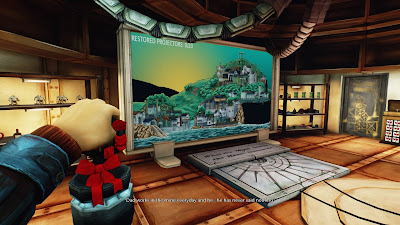Quick Note: Aspiring to be on the same level as other famous first-person exploration games, such as Gone Home, Ether One is a buggy disappointment that makes it hard to play and the story even harder to follow the plot. All of its potential can't help make this game good. I would recommend skipping this one.
As more and more tools become available for smaller developers to create and publish games to the mass audience, the first-person adventure genre seems to become almost as common as first-person shooters. There's a reason why these types of games are so popular: they put the person inside the game. There is a feeling of being involved that is harder to emulate when you create character for players to control rather than allowing the user to feel like it is he/she inside the game. Ether One is one of the newer first-person adventure games to join the fold, but it just doesn't live up to the greater options out there.
In Ether One, players will assume the role of a Restorer for a futuristic company that can help cure the dementia of 69 year old Jean Thompson. In order to tackle the disease, the Restorer is sent into the afflicted person's mind to help recover powerful memories that can be used to bring the missing information to light. It's a unique story that allows for a bit of world manipulation and trippy scenarios to play through, which is something I love. The Restorer is silent, but Dr. Edmunds lends her voice to narrate the story as the player moves from level to level, fleshing out small details and helping build the mystery as well as the emotion of the storyline.
 |
| There are plenty of notes and letters to find that help flesh out the story, but even these can't help clarify what the hell is going on. |
 |
| The bright red color of the ribbons add an interesting sense of color to the levels, even if collecting them isn't all that interesting. |
 |
| Thankfully, these sections are only 30 seconds to 3 minutes long. |
Outside of collecting Ribbons, there are also Knocker trophies to find, which are scattered across all of the levels, voice mails to listen to, and Projectors to help put back together. The Knocker trophies all help tell the tale of the fabled Knocker, a fairy tale creature within the town of Pinwheel. Each trophy picked up tells a portion of the story, so collecting all nine leads to the entire tale of the Knocker. The voice mails are found on special golden phones. There are six total that help build on the mystery of the dementia patient the Restorer is helping. Both of these collectibles are divided amongst the different locations, but finding them is not very hard.
 |
| Projectors are broken when you first stumble across them. In order to fix them, you'll have to use your brain so solve puzzles. |
What this all means is that it is possible to complete the game without solving a single puzzle. Players can simply stumble through the game and reach the end without too much effort, completing the game in roughly 3 hours without hurting their brains in the process. It sounds great on paper, but ultimately leads to a boring experience.
 |
| Completing projectors adds more play through value to the game and also rewards players with more information from Dr. Edmunds. |
Outside of the puzzles and collectible bugs there are even more technical problems. Random slow down plagued me while playing. For no real reason, the game would slow down to the point where holding down the analog stick in a direction would only turn the character a few pixels every five seconds. Shutting the game down fixed this issue, but it disrupted my current puzzle or thought process with the game and often causing me to lose progress because the game hadn't saved where I was. Another large issue had to do with moving between certain areas causing the game to freeze. Upon restarting the game, the game took 15 minutes to load my save. 15 minutes! That is insane! Had I not been distracted by my roommate playing a game on his TV next to me, I would have assumed the game was broken and quit halfway through it.
 |
| Unfortunately, there are just better FPX games out there, despite how interesting this game could have been. |
4.5 out of 10
Interesting Links:

No comments:
Post a Comment